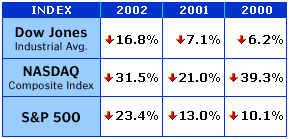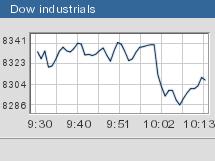NEW YORK (CNN/Money) -
Stocks limped to a mixed close Tuesday but ended the year lower for the third year running, something last seen when the United States was drawn into World War II.
The Dow Jones industrial average (up 8.78 to 8341.63, Charts) edged higher for the day but sank 16.8 percent for the year, its worst performance since 1977.

The Nasdaq composite (down 4.03 to 1335.51, Charts) fell modestly Tuesday, capping a whopping 31.5 percent decline for the year. And the Standard & Poor's 500 index (up 0.43 to 879.82, Charts) ended the day little changed but was down 23.4 percent for the year -- a year that many investors were happy to put behind them.
Just about anywhere investors looked this year they found things not to their liking: global tensions over Iraq and possible new terrorist attacks, spiraling oil prices, corporate accounting scandals, and an economy struggling to recover from the first recession in a decade in 2001.
All of these created great uncertainty, which is what investors like least of all.
"In 2002 it was quite evident as the year went by that people were worried about earnings or worried about the economy, politics -- and areas that did well were things like government bonds, gold [and] real estate," Subodh Kumar, managing director at CIBC World Markets, told CNNfn's Market Call.
Bonds, gold and real estate are often viewed as safe havens by investors during times of turmoil.
"I think that when we look into 2003, the key issue, first of all, is political resolution," Kumar said.
The year was so difficult for investors and consumers alike that many Americans even slashed their spending during the holidays. The nation's retailers are finding holiday sales the weakest since results were tracked regularly starting in 1970. (For more on the holiday shopping season, click here).
The last time the 30-share Dow industrials and the Standard & Poor's index of 500 stocks fell for three consecutive years was the period between 1939 and 1941. It was the first time for the Nasdaq, which was not formed until 1971.
The Dow, the world's most widely watched stock index, sank 6.2 percent for the month, its worst December since December 1931, during the Great Depression. Its drop for the year was the biggest since 1977. If stock prices fall again in 2003, it would be the first time the Dow and S&P logged losses for four straight years since 1932.
"It seems highly doubtful that Jan. 2 will prove to be the lows for 2003 and (that) the market is on the cusp of a rocket shot," said David Briggs, head of equity trading at Federated Investors. "Similarly, it seems equally unlikely that stocks will decline dramatically."
Investors' faith was knocked from the year's outset, with questions swirling around corporate ethics and financial reporting after the collapse of Enron in December 2001.
WorldCom, ImClone, Adelphia and Tyco all crumbled in the wake of the Enron accounting scandal, and investors' faith was tested into the last days of 2002. On Monday, embattled Tyco (TYC: up $1.73 to $17.08, Research, Estimates) said an internal probe had found no "significant fraud" but investigators did find at least $382 million in accounting errors for 2002.
More than 30 executives were indicted for accounting-related fraud in 2002.

Worries over rising oil prices -- from the uncertainty in Iraq and the Middle East, as well as a month-long strike in Venezuela, the world's No. 5 exporter -- also pained investors.
Oil prices hit two-year highs during the last week of 2002 as the United States said it would ready some of its military to be positioned for a possible war with Iraq by the end of January. The price of a barrel of light crude closed the year at $31.20, up 48.5 percent from $21.01 at the start of 2001.
War fears and other uncertainty also caused a spike in gold and Treasury prices. Meanwhile, the U.S. dollar, also a traditional haven for investors, seemed to lose that status this year, as the currency fell sharply, especially at the end of the year.
Treasury prices rose as investors flocked to the safe-haven bonds, which often rise in times of stock market and economic instability. The 10-year note rose to 101-15/32, sending the yield to 3.81 percent, from an average of 5.09 percent in December 2001. The 30-year bond ended at 109-4/32, with the yield falling to 4.78 percent from 5.48 percent in the final month of last year.
Gold, which began the year at $278.95 a troy ounce, ended 2002 at $348.20 -- a gain of 24.8 percent.
The dollar fell 18 percent against the euro, which hit its highest level -- $1.05 -- since November 1999 on the last day of 2002. The euro began the year at 88.95 cents. And the U.S. currency fell nearly 10 percent against the yen to �118.77 from �131.66.
Asian and European stocks, like their counterparts in the United States, also closed out the year with significant losses.

|

